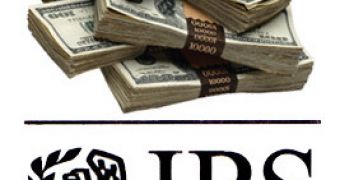US citizens are warned that a spam message claiming to originate from the IRS (Internal Revenue Service) is circulating on the Internet. The users are lured by a "stimulus payment" message into visiting a phishing site and providing the scammer with their private data. There are several security risks associated with handing out this kind of information, such as ID theft, or having your bank account bled dry.
Raphel Tulino, spokesperson with the IRS comments: "New scams are popping up, all attempting to extract personal, intrusive information from recipients using the IRS as a lure. The notification is phony. The IRS does not contact folks out-of-the-blue about refunds, surveys, probes or reports."
The Government is already in possession of all the information it needs about you and will never try to obtain additional data in this manner, said Carrie Resch, also a spokesperson for the IRS.
Here is a fragment from the actual spam message: "After the last annual calculations of your fiscal activity we have determined that you are eligible to receive a Stimulus Payment. Please submit the Stimulus Payment Online Form in order to process it. A Stimulus Payment can be delayed for a variety of reasons. For example submitting invalid records of applying after the deadline".
This last sentence basically informs you to make sure all the information you provide is as accurate as possible, a technique frequently employed by scammers. The message ends with a red colored warning stating that "for security reasons, we will record your IP-address, the date and time," which gives the message an official note.
If you click on the link included in the mail you will be directed to a phishing site, where you have to fill out a form with loads of personal data (full name, address, date of birth, social security number, credit card info, and so on). The last pieces of information you are asked to fill in are, and I quote "ATM PIN Number" and "Confirm PIN Number". This is about the perfect time to realize that it is a scam, since no state institution or organization will ever ask for your credit card PIN number. Even if you are not that computer literate, you should know by now that this is highly sensible information that should not be entrusted to anyone.

 14 DAY TRIAL //
14 DAY TRIAL //